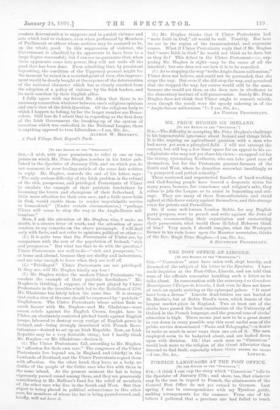[TO THE EDITOR OF THZ " SPECTATOR,"]
SIR,—I wish, with your permission, to refer to one or two points on which Mr. Price Hughes touches in his letter pub- lished in the Spectator of January 17th, and on which you do not comment in your leading article of the same date written in reply. Mr. Hughes, towards the end of his letter, says : -" The only serious difficulty of the Irish problem is the refusal of the rich, prosperous, and privileged Protestants of Ulster to emulate the example of their patriotic forefathers by becoming the lovers and champions of their fatherland. A little more affection for their own race, and a little more faith in God, would enable them to render imperishable service to humankind." [Under certain circumstances,] "perhaps Ulster will cease to stop the way to the Anglo-Saxon mil- lennium."
Now, I ask the attention of Mr. Hughes, who, I make no -doubt, is a sincere lover of truth, and the attention of your readers, to my remarks on the above paragraph. I will deal only with facts, and not refer to opinions, political or other :— (1.) It is quite true that the Protestants of Ulster are, by comparison with the rest of the population of Ireland, "rich and prosperous." But what has that to do with the question P Ulster Protestants are well-to-do—" rich and prosperous "- at home and abroad, because they are thrifty and industrious, and are wise enough to know when they are well off.
(2.) "Privileged." Ulster Protestants are not privileged. If they are, will Mr. Hughes kindly say how ?
(3,) Mr. Hughes wishes the modern Ulster Protestants "to -emulate the example of their patriotic forefathers." Mr. Hughes is thinking, I suppose, of the part played by Ulster .Protestants in the troubles which led to the Rebellion of 1798. Mr. Gladstone has lately taken the same line. It is strange that such a view of the case should be expressed by " patriotic " Englishmen. The Ulster Protestants whose action finds so much favour with Mr. Hughes—and Mr. Gladstone—were :sworn rebels against the English Crown, fought, here in Ulster, an obstinately contested pitched battle against English troops, laboured to destroy every vestige of English power in Ireland, and-,--being strongly inoculated with French Revo- lutionism—desired to set up an Irish Republic. Now, an Irish .Republic may be a very desirable thing; but I hardly think Mr. Hughes—or Mr. Gladstone—desires it.
(4.) The Ulster Protestants fail, according to Mr. Hughes, • in "affection for their own race." The congeners of the Ulster Protestants live beyond sea, in England and (chiefly) in the :Lowlands of Scotland, and the Ulster Protestants regard them with affection. On the other hand, they have, as a body, no 'dislike of the people of the Celtic race who live with them in the same island: At the present moment the hat is being 'vigorously passed round among them, and they are generously 'contributing to Mr. Balfour's fund for the relief of members -of the ether race who live in the South and West. But they object to being placed in political subservience to this other race, for snembers of whom the hat is being passed round, and, brlatly„ WI not have it. (5.) Mr. Hughes thinks that if Ulster Protestants had "more faith in God," all would be well. Possibly. But here we are in the region of the transcendental, and argument ceases. What if Ulster Protestants reply that if Mr. Hughes had "more faith in God," he would not think as he does, but as they do P This defect in the Ulster Protestant—i.e., sup- posing Mr. Hughes is right—may be the cause of all the mischief ; but one does not see how it is to be remedied.
(6.) As to stopping the way "to the Anglo-Saxon millennium," Ulster does not believe, and could not be persuaded, that she stops the way. But even if she did stop the way, and perceived that she stopped the way, her course would still be the same, because she would act then, as she does now, in obedience to the elementary instinct of self-preservation. Surely Mr. Price Hughes does not think that Ulster ought to commit suicide, even though the result were the speedy ushering in of the "Anglo-Saxon millennium " P—I am, Sir, &c.,
AN ULSTER PROTESTANT.






































 Previous page
Previous page